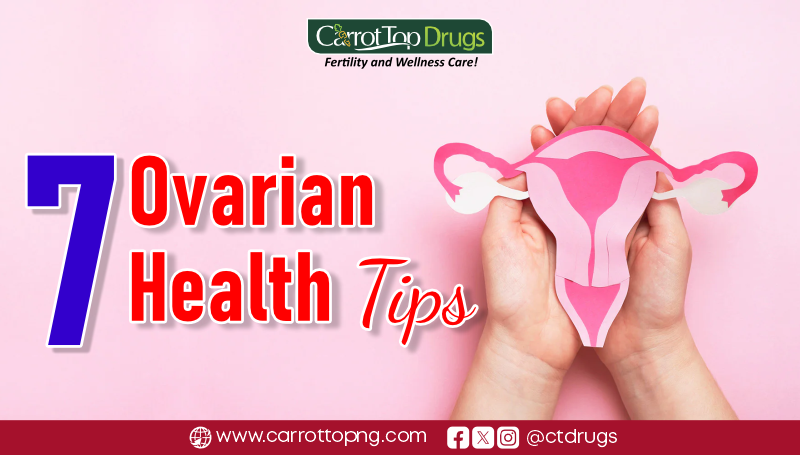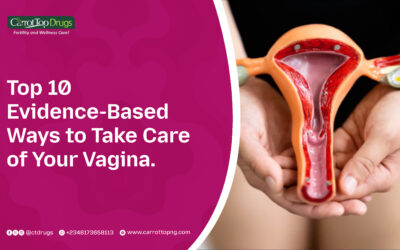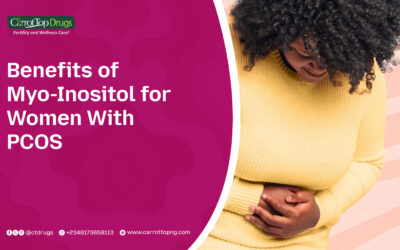Introduction
Ovarian health is a critical aspect of women’s overall well-being, affecting fertility, hormonal balance, and general health. Maintaining healthy ovaries is essential for reproductive success and minimizing risks associated with ovarian-related conditions. This article explores various ovarian health tips that can help women support and maintain their ovarian function effectively.
What Does Ovarian Health Mean?
Ovarian health refers to the proper functioning and condition of the ovaries, which are the reproductive glands responsible for producing eggs and hormones such as estrogen and progesterone. Healthy ovaries are crucial for regular menstrual cycles, fertility, and hormonal balance. According to the American College of Obstetricians and Gynecologists (ACOG), good ovarian health means the absence of disorders such as polycystic ovary syndrome (PCOS), ovarian cysts, and ovarian cancer, along with regular ovulation and hormone production.
Statistics of Women with Poor Ovarian Health
Statistics indicate that poor ovarian health is a significant concern among women worldwide. According to the World Health Organization (WHO), approximately 10% of women of reproductive age suffer from polycystic ovary syndrome (PCOS), a leading cause of infertility. Furthermore, the Centers for Disease Control and Prevention (CDC) reports that ovarian cancer is the fifth leading cause of cancer deaths among women in the United States, with an estimated 21,750 new cases and 13,940 deaths in 2020 alone. These statistics underscore the importance of prioritizing ovarian health tips to prevent and manage these conditions effectively.
Implications of Poor Ovarian Health
Infertility
One of the most significant implications of poor ovarian health is infertility. Conditions such as PCOS and ovarian cysts can disrupt ovulation and hormone production, leading to difficulties in conceiving. Infertility can have profound emotional and psychological impacts on women, making it crucial to address ovarian health issues promptly.
Hormonal Imbalances
Poor ovarian health can result in hormonal imbalances, affecting various bodily functions. Hormonal imbalances can lead to irregular menstrual cycles, severe PMS, and symptoms such as acne, weight gain, and mood swings. These imbalances can also impact other aspects of health, including bone density and cardiovascular health.
Increased Risk of Ovarian Cancer
Women with poor ovarian health, particularly those with a family history of ovarian cancer or genetic predispositions, face an increased risk of developing ovarian cancer. Early detection and prevention strategies are essential in reducing this risk and ensuring timely intervention.
Metabolic Issues
Conditions like PCOS are often associated with metabolic issues such as insulin resistance and type 2 diabetes. Poor ovarian health can exacerbate these problems, leading to further complications and affecting overall well-being.
Ovarian Health Tips
1. Maintain a Healthy Diet
A balanced diet rich in nutrients is one of the most effective tips for maintaining good ovarian health. Consuming a variety of fruits, vegetables, whole grains, lean proteins, and healthy fats can support ovarian function. Here’s an in-depth look at how a healthy diet contributes to ovarian health:
Nutrient-Rich Foods
Incorporating a wide range of nutrient-rich foods into your diet is crucial for supporting ovarian health. Fruits and vegetables, particularly those high in antioxidants like berries, leafy greens, and citrus fruits, help reduce oxidative stress and inflammation in the body. Whole grains such as quinoa, brown rice, and oats provide essential vitamins, minerals, and fiber, promoting overall health and balanced hormone levels. Lean proteins, including chicken, fish, beans, and legumes, supply the necessary building blocks for hormone production and repair of ovarian tissue.
Healthy Fats
Healthy fats are essential for maintaining hormonal balance and supporting ovarian function. Omega-3 fatty acids, found in fatty fish like salmon, walnuts, and flaxseeds, have anti-inflammatory properties and can improve blood flow to the ovaries. Monounsaturated fats, found in olive oil, avocados, and nuts, also support hormone production and reduce inflammation. Incorporating these healthy fats into your diet can help ensure that your body has the necessary nutrients to support ovarian health and overall reproductive function.
Antioxidants and Micronutrients
Antioxidants and micronutrients play a critical role in protecting ovarian health and supporting fertility. Some antioxidants like vitamins C and E, found in fruits, vegetables, nuts, and seeds, help protect ovarian cells from damage caused by free radicals. Micronutrients such as zinc, selenium, and folate are essential for hormone production and the proper functioning of the reproductive system. Zinc and selenium, found in foods like nuts, seeds, and seafood, support immune function and protect against oxidative stress. Folate, found in leafy greens, beans, and fortified grains, is crucial for DNA synthesis and repair, supporting the health of ovarian cells.
2. Regular Physical Activity
Regular physical activity is another crucial tip for maintaining ovarian health. Exercise helps maintain a healthy weight, reduce insulin resistance, and improve hormonal balance. Here’s an in-depth look at how regular exercise supports ovarian health:
Weight Management
Maintaining a healthy weight is essential for ovarian health. Excess body weight can lead to hormonal imbalances and increase the risk of conditions such as polycystic ovary syndrome (PCOS), which negatively impacts ovarian function. Regular exercise helps manage weight by burning calories and increasing muscle mass, which in turn boosts metabolism. Aerobic exercises, such as walking, running, swimming, and cycling, are effective for burning calories and improving cardiovascular health.
Strength training exercises, such as weightlifting and bodyweight exercises, build muscle and increase resting metabolic rate, aiding in long-term weight management. By maintaining a healthy weight through regular exercise, you can reduce the risk of obesity-related hormonal imbalances and support optimal ovarian function. It is recommended to aim for at least 150 minutes of moderate aerobic activity or 75 minutes of vigorous aerobic activity per week, combined with muscle-strengthening activities on two or more days a week.
Reducing Insulin Resistance
Insulin resistance is a condition where the body’s cells become less responsive to insulin, leading to elevated blood sugar levels. This condition is commonly associated with PCOS and can negatively impact ovarian health. Regular physical activity improves insulin sensitivity, allowing the body to use glucose more effectively and reducing the risk of insulin resistance. Both aerobic exercise and resistance training have been shown to enhance insulin sensitivity.
Incorporating a combination of these exercise types can maximize benefits for blood sugar control and hormonal balance. High-intensity interval training (HIIT), which involves short bursts of intense exercise followed by periods of rest, is particularly effective for improving insulin sensitivity. By reducing insulin resistance through regular exercise, you can lower the risk of developing metabolic and hormonal disorders that can affect ovarian function. Consistent physical activity helps maintain stable blood sugar levels and supports overall metabolic health.
Improving Hormonal Balance
Exercise plays a crucial role in regulating hormones that influence ovarian function. Physical activity helps reduce levels of stress hormones, such as cortisol, and increase the production of endorphins, which promote a sense of well-being. Regular exercise also influences the balance of reproductive hormones, such as estrogen and progesterone, which are essential for healthy ovarian function. Moderate exercise has been shown to improve menstrual regularity and reduce symptoms of conditions like PCOS, which are characterized by hormonal imbalances.
Yoga and Pilates, which focus on flexibility, strength, and relaxation, can be particularly beneficial for reducing stress and promoting hormonal balance. By incorporating regular exercise into your routine, you can support the regulation of reproductive hormones and enhance ovarian health. Aim for a balanced exercise regimen that includes aerobic activities, strength training, and flexibility exercises to achieve optimal hormonal balance and overall well-being.
3. Manage Stress
Chronic stress can negatively impact ovarian health by disrupting hormonal balance and ovulation. When the body experiences stress, it releases cortisol and other stress hormones that can interfere with the regular functioning of the reproductive system. Prolonged exposure to high levels of stress hormones can lead to irregular menstrual cycles, anovulation (lack of ovulation), and even conditions such as polycystic ovary syndrome (PCOS). Therefore, managing stress is essential for maintaining healthy ovarian function.
Incorporating stress management techniques such as yoga, meditation, deep breathing exercises, and mindfulness can help mitigate these effects. Yoga combines physical postures, breathing exercises, and meditation to promote relaxation and reduce stress. Meditation and mindfulness practices involve focusing the mind and being present in the moment, which can help reduce anxiety and stress levels. Deep breathing exercises activate the body’s relaxation response, lowering heart rate and blood pressure, and reducing the production of stress hormones. These practices not only improve mental health but also have a positive impact on hormonal balance and ovarian health.
Regularly practicing these stress management techniques can lead to improved overall well-being and enhanced reproductive health. By reducing stress, you support a more balanced hormonal environment, which can help regulate menstrual cycles and promote healthy ovulation. Incorporating these practices into your daily routine can be a valuable part of a holistic approach to maintaining ovarian health and ensuring optimal reproductive function.
4. Avoid Smoking and Excessive Alcohol
Avoiding smoking and limiting alcohol intake are important ovarian health tips. Smoking has been shown to damage ovarian follicles and accelerate the loss of eggs, which can lead to a decreased ovarian reserve and earlier onset of menopause. The toxic chemicals in cigarettes can negatively impact the DNA of eggs, increasing the risk of chromosomal abnormalities and reducing fertility. For women trying to conceive or maintain their reproductive health, quitting smoking is a critical step in preserving ovarian function and overall fertility.
Excessive alcohol consumption can disrupt hormonal balance and negatively affect ovarian health. Alcohol can interfere with the regulation of the menstrual cycle by altering levels of estrogen and progesterone, the hormones responsible for ovulation and menstruation. Chronic heavy drinking can lead to irregular periods, anovulation, and other reproductive issues. Even moderate alcohol consumption can have a cumulative effect on hormonal health over time. To support ovarian health, it is advisable to drink alcohol in moderation and be mindful of its potential impact on reproductive function.
Quitting smoking and drinking in moderation can significantly improve ovarian health and overall reproductive well-being. By eliminating these harmful habits, you can reduce the risk of ovarian damage and hormonal imbalances. Embracing a lifestyle that prioritizes ovarian health involves making conscious choices to avoid substances that can harm your reproductive system. These changes not only benefit ovarian function but also contribute to a healthier, more balanced lifestyle.
5. Stay Hydrated
Staying well-hydrated is a simple yet effective ovarian health tip. Drinking plenty of water helps maintain overall bodily functions, including those related to the ovaries. Adequate hydration is crucial for the body’s ability to transport nutrients and hormones, which are essential for the proper functioning of the reproductive system. Dehydration can lead to a decrease in blood flow to the ovaries, potentially affecting their health and function.
Proper hydration supports cellular health and hormonal balance. Water is a key component of cells and tissues, and maintaining adequate hydration ensures that cells can function optimally. This includes the cells within the ovaries, which rely on a well-hydrated environment to facilitate processes such as follicle development and ovulation. Additionally, hydration helps regulate the production and balance of hormones, which are critical for reproductive health. Imbalances in hydration can disrupt the delicate hormonal environment necessary for regular menstrual cycles and fertility.
Incorporating sufficient water intake into your daily routine can have significant benefits for ovarian health. Aim to drink at least eight 8-ounce glasses of water per day, or more if you are physically active or live in a hot climate. Staying hydrated not only supports ovarian function but also contributes to overall well-being, energy levels, and the efficient operation of all bodily systems. Making hydration a priority is a simple yet powerful way to enhance reproductive health and ensure that your ovaries function optimally.
6. Regular Health Check-ups
Regular gynecological check-ups are vital for maintaining ovarian health. Routine screenings, such as pelvic exams, ultrasounds, and blood tests, can help detect any abnormalities or conditions affecting the ovaries early on. These check-ups allow healthcare providers to monitor ovarian function and identify potential issues such as ovarian cysts, fibroids, or signs of polycystic ovary syndrome (PCOS). Early detection of these conditions is crucial for implementing timely and effective treatment strategies.
Pelvic exams are a fundamental part of regular health check-ups and provide an opportunity for doctors to physically examine the ovaries and other reproductive organs. This can help identify any structural abnormalities or signs of inflammation that may indicate underlying issues. Ultrasounds offer a more detailed view of the ovaries, allowing for the detection of cysts, tumors, or other irregularities that might not be noticeable during a physical exam. Blood tests can also be used to measure hormone levels and detect hormonal imbalances that could impact ovarian health.
Early detection is key to managing and treating ovarian health issues effectively. Identifying conditions in their initial stages often allows for less invasive treatment options and can prevent more serious complications. Regular health check-ups empower individuals to take proactive steps in maintaining their reproductive health and can lead to better outcomes through early intervention. Prioritizing routine gynecological visits is a simple yet powerful way to ensure that any potential ovarian health issues are ad
7. Consider Supplements
Certain supplements can support ovarian health. Supplements such as omega-3 fatty acids, vitamin D, and CoQ10 have been shown to benefit ovarian function and hormonal balance. Evergreen Formular for Women, Evergreen Eggboost and Evergreen Omega-3 are leading supplements in Nigeria that can help supply these nutrients. However, it is important to consult with a healthcare provider before starting any supplementation as part of your ovarian health tips regimen.
Conclusion
Maintaining ovarian health is essential for women’s overall well-being and reproductive success. By following these ovarian health tips, women can support their ovarian function, reduce the risk of related conditions, and enhance their quality of life. A proactive approach to ovarian health can lead to better fertility outcomes, hormonal balance, and overall health.
FAQs
1. What are the best ovarian health tips?
The best ovarian health tips include maintaining a healthy diet, regular exercise, stress management, avoiding smoking and excessive alcohol, staying hydrated, regular health check-ups, and considering supplements.
2. How does diet affect ovarian health?
A balanced diet rich in nutrients supports ovarian function by reducing oxidative stress and inflammation. Foods like fruits, vegetables, whole grains, and lean proteins are beneficial for ovarian health.
3. Can exercise improve ovarian health?
Yes, regular exercise helps maintain a healthy weight, reduce insulin resistance, and improve hormonal balance, all of which support ovarian health.
4. Why is stress management important for ovarian health?
Chronic stress can disrupt hormonal balance and ovulation. Stress management techniques like yoga and meditation can promote relaxation and improve ovarian health.
5. How do smoking and alcohol affect ovarian health?
Smoking can damage ovarian follicles, and excessive alcohol consumption can disrupt hormonal balance. Avoiding these substances can significantly improve ovarian health.
6. Are there supplements that can help with ovarian health?
Supplements such as omega-3 fatty acids, vitamin D, and CoQ10 can support ovarian health, but it is important to consult with a healthcare provider before starting any supplementation.
7. Why are regular health check-ups important for ovarian health?
Regular check-ups help detect any abnormalities or conditions affecting the ovaries early on, enabling timely intervention and management to maintain optimal ovarian health.

















